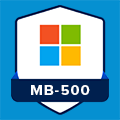Clientele ➞
























Duration: 5 Days
After completing this course, candidates will be able to:
Module 1: Overview & Architecture
This module explains the Dynamics 365 ecosystem and major components of the Dynamics 365 Finance and Operations (FO) software, the architecture of D365FO, relevant D365FO design and deployment considerations.
Hands-on Lab: Development Environment configuration and Project/Model Creation
Module 2: Developer Tools
In this module, you will learn how to manage system implementations by using Lifecycle Services, how to customize D365FO by using Visual Studio, manage source code and artifacts by using version control, and how to work with other development tools to complete tasks.
Hands-on Lab: Source Control using DevOps
Module 3: Solution Design
This module will teach you to determine the required application stack components and server architecture, implement Application Lifecycle Management (ALM), and design a solution for D365FO.
Hands-on Lab: Data Structure Development
Module 4: AOT Elements In this module, you will learn how to create forms, create and extend tables, create extended data types (EDT) and enumerations, create classes and extend AOT elements.
Hands-on Lab: Metadata Extension & Development
Module 5: Code Development & Testing
In this module, you will learn how to develop X++ code, develop object-oriented code, extend D365 FO functionality, describe test framework and tools, and perform unit testing.
Hands-on Lab: Code Extension & Development
Module 6: Data Migration
In this module, you will learn to describe migration tools and methodologies, plan migration strategy, prepare data for migration and migrate data.
Hands-on Lab:
Module 7: Frameworks
In this module, you will learn how to implement D365 FO functionality.
Hands-on Lab: SysExtension Framework
Module 8: Integration
In this module, you will learn to identify Data integration patterns and scenarios, implement Data integration concepts and solutions, implement Recurring integrations, integrate D365FO with Microsoft Azure, troubleshoot integration errors, and implement the Data Management Package API.
Hands-on Lab: OData Integration
Hands-on Lab: Logic App Integration
Hands-on Lab: Calling an External Web Service
Module 9: Reporting
In this module, you will learn about the capabilities and limitations of reporting tools in D365FO. You will also learn to design, create, and revise Dynamics Reports, Dynamics workspaces, data sources that connect to data stores external to D365FO.
Hands-on Lab: Power BI reporting from F&O
Module 10: Security & Performance
In this module, you will learn to implement performance tools, LCS Environment Monitoring tools, role-based security policies and requirements. You will also learn to apply fundamental performance optimization techniques and optimize performance for batch processes, user interface performance, and report performance.
Hands-on Lab: Async & Sandbox Functionality
A Microsoft Dynamics Certified Trainer.
$1995
Our Partners
